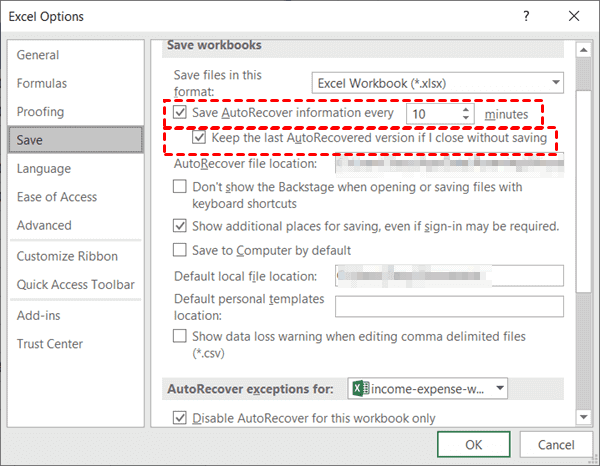Recover Unsaved Excel Files: Simple Tips

Have you ever faced the heart-sinking moment when you realize that hours or even days of work in Excel could vanish in an instant due to an unsaved file or a sudden power outage? Losing important data can be incredibly frustrating, but there are several strategies to recover unsaved Excel files that many users might not be aware of. This detailed guide will walk you through the process of recovering your lost Excel files, offering both quick fixes and preventive measures to safeguard your future work.
Immediate Steps to Take

If you find yourself in the dreaded situation of an unsaved Excel file, don't panic. Here are some immediate steps you can take:
- Check for AutoRecovery: Excel has a feature called AutoRecovery which might save you. Here's how to look for it:
- Open Excel.
- Go to "File" > "Info" > "Manage Document" > "Recover Unsaved Workbooks."
- Look for any documents with the extension ".xlsb" or ".xlsx."
- Check Recent Documents: Sometimes, Excel might have saved the file but not in the location you expect:
- Go to "File" > "Recent."
- Look under "Recover Unsaved Workbooks" or "Unsaved Documents."
- Search for Temporary Files: Excel stores temporary files that could potentially be recovered:
- Open File Explorer.
- Navigate to:
C:\Users\[YourUsername]\AppData\Local\Microsoft\Office\UnsavedFiles - Look for files with the extension ".tmp."
Recovering from Temporary Files

Temporary files can often hold the key to recovering your lost work:
- Search for .tmp files: Use Windows File Explorer to search for files with the ".tmp" extension.
- Use File History: If you've turned on File History, you might find an earlier version of your document:
- Right-click on a similar recent Excel file.
- Select "Properties" > "Previous Versions" > "Open" to review available versions.
- Third-party Recovery Tools: Programs like Recuva or Stellar Data Recovery can scan your computer for recoverable files:
- Download and install the recovery software.
- Follow the software instructions to perform a deep scan for Excel files.
💡 Note: Be cautious with third-party recovery tools. Some may alter your original file's structure or introduce malware. Always use reputable software and keep your system up-to-date.
Excel AutoSave and AutoRecover Options

To prevent future losses, you need to tweak the AutoSave and AutoRecover settings:
- Enable AutoRecover:
- Go to "File" > "Options" > "Save."
- Check the box for "Save AutoRecover information every X minutes."
- Set the interval to your preferred frequency (e.g., 5-10 minutes).
- Set AutoSave: This is particularly useful if you're using Excel online or have Microsoft 365 subscription:
- Open Excel, go to "File" > "Options" > "Save."
- Enable "AutoSave OneDrive and SharePoint Online files by default in Excel."
Backup Your Excel Files

Regular backups can be a lifesaver:
- Manual Backups: Regularly save your work in different locations or use cloud storage services like Dropbox or Google Drive.
- Version History in Excel Online: If you're using Excel online, the system automatically tracks versions, allowing you to revert to previous versions if needed:
- Go to "File" > "Info" > "Manage Workbook" > "Browse Version History."
- Select a previous version to open and save it if necessary.
| Recovery Method | Action | Description |
|---|---|---|
| AutoRecover | Recover Unsaved Workbooks | Excel's built-in feature that periodically saves workbooks. |
| Recent Documents | Check Recent | Look for recently opened or saved files in the "Recent" tab. |
| Temporary Files | Search for .tmp | Search Windows for temporary Excel files that might contain recent data. |
| Third-Party Tools | Deep Scan | Use recovery software to perform a deep scan of your drive. |
| Backup | Manual/Auto | Regularly save files to different locations or utilize cloud services for automatic backups. |

🔍 Note: When using third-party recovery tools, ensure you understand the limitations and the potential for data corruption. Always test recovery tools on non-critical data first.
In summary, recovering unsaved Excel files can be approached through several methods like using AutoRecover, checking recent documents, searching for temporary files, employing third-party recovery tools, and setting up regular backups. Understanding these options not only helps in file recovery but also in preventing future data loss. By adopting these practices, you'll mitigate the risk of data loss and secure your valuable work. If you follow these steps, you'll be better prepared for any future unexpected scenarios in Excel.
How often should I save my Excel workbook?

+
It’s recommended to save your work at least every 10 minutes or more frequently if you’re working on critical data. Excel’s AutoRecover can also help with automatic saving.
Can I recover an Excel file after a computer crash?

+
Yes, if AutoRecover is enabled, check for unsaved documents or use File History or third-party recovery software to locate the last saved temporary files.
What are the benefits of using cloud storage for Excel files?

+
Cloud storage provides automatic backups, version control, and the ability to work from anywhere with internet access. Services like OneDrive, Dropbox, or Google Drive automatically save your work and allow for easy recovery of previous versions.
Is it safe to use third-party recovery tools?

+
Most reputable recovery tools are safe, but always ensure you’re downloading from trusted sources, read user reviews, and be aware that there’s always a risk of data corruption or malware.
What should I do if none of these methods work?

+
If standard recovery methods fail, consider professional data recovery services or check if your files are recoverable from any other backups or external storage devices you might have used.